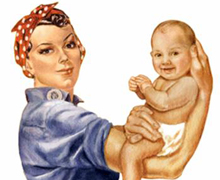By Charles Murray | I’ll cut President Obama some slack. When he said that women staying at home with the kids is “not a choice we want Americans to make,” I assume he meant that it shouldn’t be a choice that women are forced to make. Even so, I have a beef with the tunnel vision that accompanies the conversation about women staying at home, as if it’s a balancing act between income and child care.
“What’s your schedule today?” I asked my wife a few minutes ago. Today, it starts with a trip into the nearby small city to do volunteer work for the local Literacy Council, which provides free English instruction for immigrants. That’s today. Tomorrow, it will be one of a half-dozen other civic obligations she has chosen to take on. She’s not unusual. In that crucially important reality—she’s not unusual—is something that needs to be front and center when we talk about women who “stay at home.” Better parental care is one of the benefits, but I think the effects on America’s social capital are even more important.
“Social capital” is the academicians’ term for the resource that makes American civil society work. It is organized things like teaching English to immigrants or serving on the town council. It is also the guy who shovels snow from the sidewalk of the old lady who lives alone across the street. It is parents at PTA meetings, church-goers organizing Christmas plays, candy stripers at the local hospital, and neighbors keeping an eye on each other’s houses when no one is home.
The point is that many of the important forms of social capital take more time than a person holding a full-time job can afford. Who has been the primary engine for creating America’s social capital throughout its history, making our civil society one of the sociological wonders of the world? People without full-time jobs. The overwhelming majority of those people have been wives.
Every aspect of family and community life gets an infusion of vitality and depth from wives who are not working full time. If you live in a place that you cherish because “it’s a great community,” think of the things you have in mind that make it a great community (scenery and restaurants don’t count), and then think about who bears the brunt of the load in making those things happen. If you live in a place that is not a community—it’s just a collection of unrelated people, living anonymously, without social capital—think of the reasons why it is not a community. One of the answers will be that no one has spare time for that kind of thing.
I’m not knocking the importance of stay-at-home moms for raising children. I just want us to realize that stay-at-home wives are one of the resources that have made America America. It is entirely understandable that some wives work full time, either for the fulfillment of a vocation or to make money–the same reasons men work full time. But when either partner in a marriage—and it will usually be the wife—chooses to devote full time to being a parent and neighbor instead, that choice should not just be accepted, but celebrated.
If you found this blog post of interest, you might want to explore these Free Think University courses:
For this third party post in its full context, please go to:
http://www.aei.org/publication/crucial-importance-stay-home-wives/
© 2014. The American Enterprise Institute. www.aei.org














